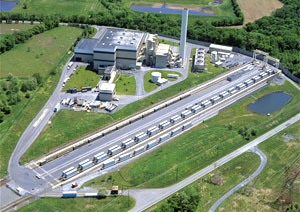For those who have not been following this environmental issue, the City of Dallas wanted to turn the McCommas Bluff Landfill into a recycling center, a environmentally friendly place where all trash is converted into energy. In order to make such a development economically feasible, the center would need a lot more trash than it is receiving now. So the city passed an ordinance requiring that all trash collected in the city of Dallas be taken to McCommas Bluff for depositing.
 |
| The City wanted to use Flow Control to turn this ... |
 |
| ... into this |
The city appealed the ruling which put one of those private haulers, Waste Management, in a terrible predicament. Waste Management was the company that was stalling for time so it could figure out a way to bid on the McCommas recycling center. The problem for the private hauler was that another city ordinance prohibits any company that has a lawsuit pending against the City to bid on another City project. Waste Management had two options: Settle the suit or file another suit against the city challenging the "no-bid-allowed" ordinance.
The decision was made to settle.
At first glance, it may have looked like the city came out looking good. The Flow Control Ordinance, as it is written, is allowed to stand. It is legal. It’s when you get to the fine print that you see the City came out of this covered in garbage. Yes, the Flow Control Ordinance can stand but it can’t be enforced against any private haulers who signed a franchise with the city before the ordinance was passed during the life of that franchise agreement.
It wasn’t that long ago that the city charged private haulers a fee based on the number of dumpsters it placed throughout burg. Each dumpster was required to have a city sticker on it and those stickers had to be purchased from the City. Problem was the City didn’t have enough dumpster cops to go around inspecting every dumpster in the city to see if it had sticker on it and many of the private haulers knew this so they had dumpsters — lots and lots of dumpsters — out there without stickers.
So the City came up with a new plan in 2009: franchising the haulers. Under this proposal, in order to collect garbage within Dallas City Limits the haulers had to open their books to the City which would charge them a percentage of their income as a "franchise fee." The haulers went along with this and signed 20-year franchise agreements.
Get the picture now? That means the city can’t force these haulers to obey the perfectly legal Flow Control Ordinance until the year 2029. That doesn’t seem like too much of a "win" for the City as far as I can see. I’m at a loss to explain why the City agreed to this when it seemed, based on Supreme Court precedents, it had the winning hand.
But then the City of Dallas, especially when it comes to the City Attorney’s Office, has never been much of a fine-tuned fighting machine.
Of course, any new private hauling firm that wants to do business with the City of Dallas will have to obey Flow Control and take its collection to McCommas. But I don’t see any new haulers knocking on the City’s doors these days.



No comments:
Post a Comment